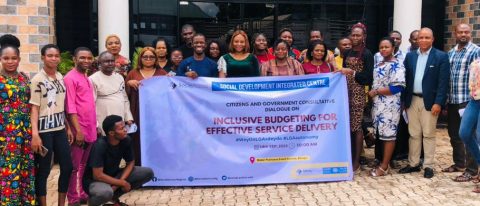News Feature: SocialAction Pushes For LGA Autonomy, Seeks Tinubu’s Intervention
Articles/Opinion, Featured, Latest Headlines, News Features/Analysis Sunday, September 17th, 2023
(AFRICAN EXAMINER) – Since the inception of the local government system in Nigeria in 1976, which is a creation of the then Colonial government, nothing meaningful seem to have been achieved in the country through that 3rd tier of government established with the sole aim of driving grassroots development and take governance closer to the rural dwellers.
Rather than pursue the objectives for which that arm of government was put in place, managers of the systems across the country, including Enugu state, South East Nigeria, whether elected or appointed as the case may be, had over the years turned the LGAs as a conduit pipe to enrich themselves to the detriment of the poor suffering masses at the rural Communities.
Following the endemic and alarming corruption in the system since it’s creation in Nigeria, state governments and their partners in crime, the Council Chairmen, have always resisted and failed to implement people’s oriented reform proposals to grant Autonomy to the LGAs.
It is no longer news that local governments in the country have become mere appendages to the state governments, making them abdicate their constitutional responsibilities and creating opportunities for corruption and abuse of office by Council Chairmen, who believe they are only answerable to the state governors and not the citizens.
As a result of the impunity in the system, local government Authorities in the country hardly prepare their annual budgets, and necessary details are always missing when they manage to do so.
State governments hijack the state- local government joint account and starve the LGAs of funds to implement projects by releasing funds in a discretionary manner and making arbitrary deductions.
This ugly development in the system across the 774 Council areas in Nigeria, had made Citizens, especially rural dwellers lost complete faith and hope in the local government Administration, as many are canvassing for the scrapping of that tier of government which they said, has done more harm than good to the people.
It is a known fact that the perception of Citizens of the country on LGAs system in Nigeria is pure negative, because they strongly believe that much of the intended value of local governance had been lost as a result of certain factors such as, lack of Autonomy, transparency and accountability, poor oversight, and lack of citizens participation.
However, for some non governmental organizations, NGOs and Civil Society groups, scrapping the local government system in the country may not be for the best interest of the masses, saying it will be counter productive rather, granting them full autonomy through legislation remains the answer.
One of such reputable CSOs in the country that has been at the forefront of drumming support and driving robust campaign for LGAs autonomy in Nigeria is a Port Harcourt, Rivers state, South- South Nigeria, based Social Development Integrated Centre, popularly known as SocialAction.
The Organization has expended huge resources, organizing a series of workshops, Seminars and town hall meetings across states in the country to sensitize citizens on the need to join hands in pushing for the enthronement of LGA autonomy in the country.
As a true advocate and canvasser of the LGAs autonomy in Nigeria, the SocialAction has continued to engage the leadership of various state Houses of Assemblies on the burning issue.
Just recently, 14, September, 2023, to be precise, Social Action, organized in Enugu what it tagged: “Citizens and Government Consultative Dialogue on Inclusive Budgeting for Effective Service Delivery” which was attended by key Stakeholders in the local government system.
Speaking at the event, SocialAction Senior Programmes Office, and project Manager, Dr. Prince Ekpere Edegbuo, disclosed that the Organization is working in two local governments areas in Enugu state, which are, Enugu South and Aninri.
Represented by Comrade Kingsley Ozo, the Executive Director of an Enugu based non governmental organization NGO, Red Foundation international, which is also SocialAction implementing partner in the state, Edegbuo, harped on the need for all and sundry to key into the campaign for LGAs autonomy in the country, saying it’s for the interest of all.
He posited that developing rural Communities in Nigeria will be a mirage without the autonomy of the Council areas, adding that the issue of secrecy in LGAs budget has also remained a source of worry to citizens.
Edegbu, challenged the citizens to always ask questions concerning the budget of their respective local government areas, after educating the participants on how to be involved in budget processes, including tracking.
He listed the dangers inherent in citizens not interested in budget processes, stressing that it creates room for Council bosses to perpetrate corruption in the highest order, urging the citizens to always show interest on how their funds are being expended by managers of their local government areas.
He noted that non participation by Citizens in budget processes always lead to negligence and claim of ghost projects in rural Communities by some Council Chairmen, stressing that as owners of the council areas, they must always equip themselves with relevant and adequate information concerning their local government areas.
“As citizens, you must shun docility, you must always hold your local government Chairmen accountable, and keep them on their toes” he stated.
Earlier, in a paper entitled: “Local Government Administration and Problem of Development in Nigeria”, the guest Speaker, and labour leader, Comrade Osmond Ugwu, listed some of the factors militating against the success of LGAs in the country, which includes constitutional mixed up.
He said “Whereas, there is a provision in the constitution of Nigeria for the existence of local government as a 3rd tier of our federation and whereas the same constitution provides for certain functions for local government councils, these provisions are merely existing on the papers and not in action, and the question is ” what actually are the basic factors responsible for the non performance or functioning of local government in Nigeria despite huge sum of money available to the system and huge workforce within their disposal?
“It is reported somewhere that for the past 18 years, over 18 trillion Naira has been received by 774 local governments in Nigeria, yet there is nothing to show for that. And the question now is what is the problem of local governments in Nigeria?
“The worst scenario is that despite the fact that there is nothing to show for the huge resources within the reach of Local Government Councils in terms of infrastructure and amenities, lots of them are not able to pay staff salaries and allowances, pension and gratuities of retirees.
“In Enugu state for instance, retirees of local governments are being owed over one year arrears of pension and more than 10 years of gratuities by the last administration whereas the life style of local government chairmen and their cronies does not show that there is lack of funds for the councils.
“When you look at the life of the working staff, it is another eyesore because even the so-called minimum wage paid to other civil servants in the state is being denied to local government staff and primary school teachers in the state. As it is in Enugu, it is even worse in some other states.
“If we move around the local governments in Enugu state, just like others elsewhere, you will see the pitiable condition of primary schools, health centres, roads etc despite huge sums of money being available to them, and the question is what is the way out?
Before we talk of solutions we have to look at the causative factors. “From the look of things, it can be stated that our constitution contributes immensely to this malady. Whereas the constitution made provision for the existence of local government in section 7 (1) of 1999 Constitution of Federal Republic of Nigeria section section 7(6b) of the same constitution deprives them of autonomy by subjecting them to the control and manipulation by the state governors via the State Houses of Assembly.
“Because of that the state governments see and operate the LGAs as a department or offshoot of the state and through Joint Allocation Committees- JAC usurp the allocation of the councils to their own selfish interest. So to be precise, state governors are the major cause of why the local governments are not living up to the expectations of the people.
“Apart from the state governors, the chairmen of the councils leverage on the scenario created by the governors to enrich themselves. After the governors have taken their own share, the chairmen will fall back to the remaining for their own self enrichment after settling with the councillors.
At a media briefing to bring the one day event to climax, Edegbuo, who read a statement tittled: “Local Government Autonomy for Grassroots Development: A Call to Action, reminded the media , Civil Society Organisations that they have critical role to play in the quest to enthrone LGAs autonomy in the country.
The organization called on President Bola Ahmed Tinubu, The Governors of the 36 States, and the Houses of Assemblies to as a matter of urgency retransmit and pass into the Local Government Autonomy Bill into Law.
He noted that “Over the past two years, Social Action, in collaboration with the United Nations Democracy Fund, UNDEF, has consistently advocated for local government autonomy in Nigeria, recognizing it as the foundation for accountability at the local governments and of grassroots development. It is with a sense of urgency and unwavering commitment that we continue this crucial campaign, which has seen some states in Nigeria rally behind the cause, while others remain regrettably resistant to this progressive concept.
According to him, “during the 9th Assembly’s attempt to secure 25 percent consent from the National and State Houses of Assembly to amend the constitution, several states demonstrated their support by voting for legislation that would grant administrative and fiscal autonomy to local governments.
“However, this noble endeavour was met with unfortunate expiration, delayed until the end of the Assembly’s tenure by state governors who would rather have the third tier of government perpetually tied to their apron string for their personal selfish benefit.It is deeply concerning that Nigeria, operating under a three-tier governmental system, has only two functional tiers.
He said the local government, despite its immense potential to drive development, remains incapacitated.Meeting and StrategiesUndeterred by setbacks, we press onward.
“On September 5, 2023, we convened a virtual town hall meeting themed “Demanding Local Government Autonomy: Legal Requirements & Advocacy Strategies,” as well as Citizens and Government Consultative Dialogue On “ Inclusive Budgeting for Effective Service Delivery”
“This gatherings brought together stakeholders, Scholars, activists, and citizens to explore strategies to achieve local government autonomy, particularly in light of a new government in power.
“Compelling revelations were made at the town hall which had in attendance speakers, including Ken Henshaw, the ED of We the People, Akim Ambali the National President National Union of Local Government Employees, NULGE and Comrade John E. Mutu the National Leader PERL-ECL. Others were Barrister Okoritie Yobo, and Comrade Bonny Akaeze, Dr. Prince Ekpere Edegbuo the the Project Coordinator.
“The town hall described the local government as a vital hub for service delivery, yet the 1999 constitution has left local governments at the mercy of state governments through the Joint Account Committee, where all funds are consolidated into the state account and often diverted away from local projects.
“This practice has crippled local governments, preventing them from fulfilling their statutory functions.It was noted that amending the Constitution is imperative.
“Until local governments regain their capacity to serve their communities, good governance will remain elusive in Nigeria.
“The local government is constitutionally responsible for basic health, sanitation, and water provision, but these essential services have suffered due to the mishandling of funds by state governors.
“Constitutional roles and allocation disbursement mechanisms should be encouraged. Whereas the constitution mandates state governments to share 10 percent of their internally generated funds with local governments, in addition to federal allocations, nothing in terms of observable development can attest to, even, a fraction of the allocations.
“Shockingly, between 2008 and 2018, N14.7 trillion was disbursed to the 774 local governments in Nigeria, but much of these funds were mismanaged by state governments.
“The state governors’ stranglehold on local governments is driven by greed and a disregard for democratic laws. The citizens, who should lead the grassroots development campaign, have been passive, enabling this anomaly to persist.
“It is time for the people to mobilize, demanding not only autonomy but also transparent monthly allocation reports for local governments.
“The Way to GoWe emphasize that the fight for local government autonomy is not the sole responsibility of labour unions or NULGE; it is a collective obligation. Achieving this autonomy will benefit all citizens.
“We, therefore, call on civil society to adopt innovative strategies and persevere until we receive a positive response. We must recognize the current political and constitutional realities and ask critical questions about the intentions of state governors who oppose local government autonomy.
“Civil society, community groups, the press, pressure groups, stakeholders and well-meaning Nigerians should remain steadfast in their support for local government autonomy.
“We Call on the 774 Local Government Chairmen to run an open, inclusive and participatory regime, as well as mainstreaming gender and social inclusion into its operations, develop functional websites for communications and proactive disclosures between the people, communities and the council leadership, finally projects should be designed using the NEEDS Assessment development tool.
He added: “We will continue to support and evolve result-oriented strategies to gain the buy-in and response of the 10th Assembly and indeed the other state Assemblies to actualise this before the expiration of the tenure of the current Assembly.
“Together, let us forge a path to local government autonomy, empowering our communities for sustainable development and delivering essential services to our citizens at the grassroots level.This campaign is more important now than ever” he stated.
Related Posts
Short URL: https://www.africanexaminer.com/?p=90821





















